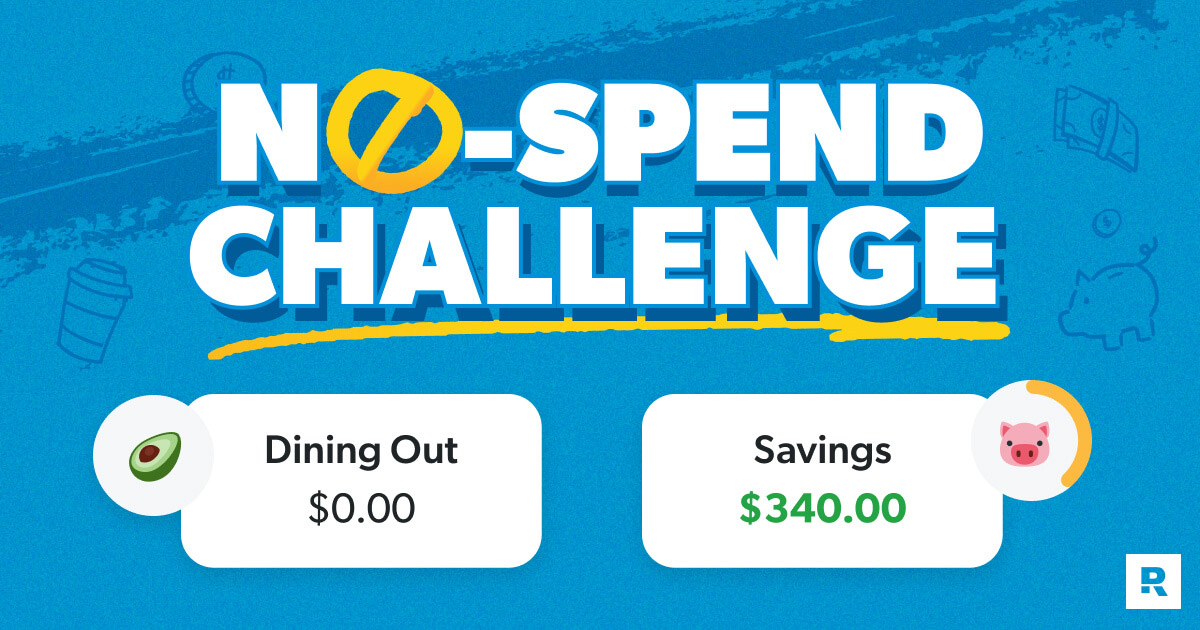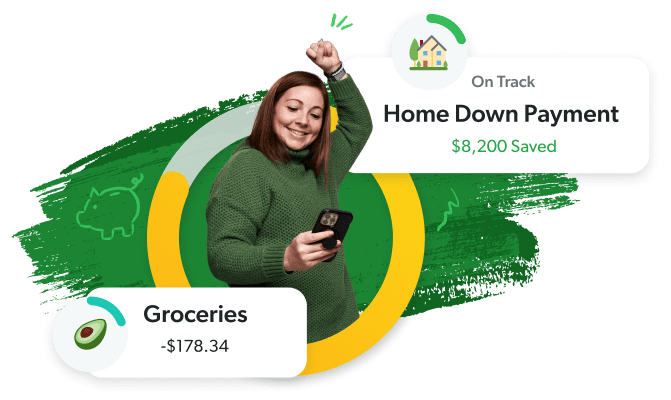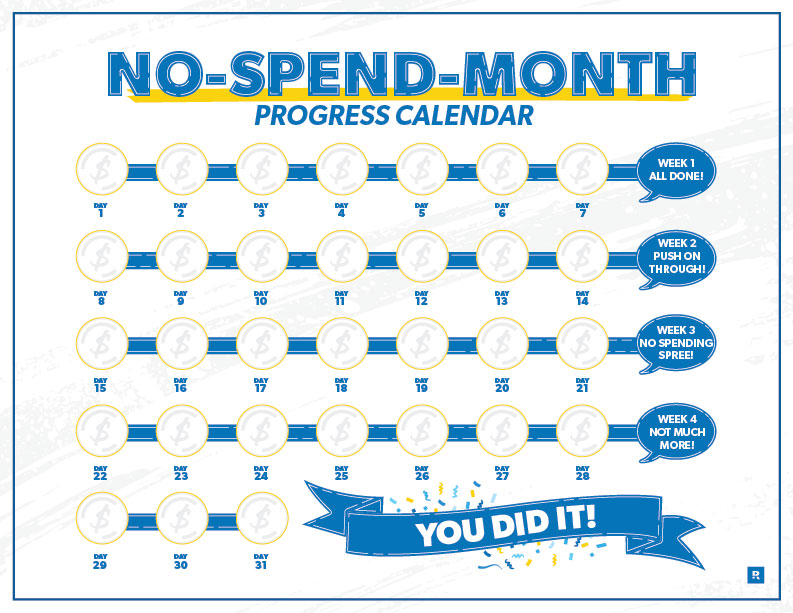What would you do with some extra money right now? We can instantly think of at least five things we’d throw that cash at. Inflation. Vacation. Tuition. Even reasons that don’t rhyme, like building an emergency fund or getting a little wiggle room in the budget.
What if you could make a few changes for a few weeks—and save big? Insert the no-spend challenge!
Listen: This challenge is worth it. So let’s walk through what no-spend even means and how you’ll do it.
What Is the No-Spend Challenge?
If you’ve got visions of locking yourself at home to make sure no money passes from your bank account to pay for anything, dash those. We’re all for saving money, but we also live in the real world.
For the no-spend challenge, you pay for essentials only for a set period of time. Thirty days is pretty common, so you might hear it called a no-spend month too.
Basically you’re covering your Four Walls (food, utilities, shelter and transportation) and other necessities, but you’re saying no to all the extras. Eating out at restaurants? Nope. Starting up polka-swing-fusion dance lessons? Not this month.
You aren’t dropping all fun forever—you’re pressing pause as you focus on savings. You’re getting intentional about your money, like a budget reset. And the benefits are totally worth the effort. But before we get to the good stuff (aka those beautiful benefits), let’s level set on the rules of your savings challenge.
Rules of a No-Spend Challenge
The truth is you have to set the nitty-gritty rules for yourself. Just how hard do you want to go here? Are you pausing or canceling subscriptions? Are you telling your BFF they don’t get a present because their birthday happens to be in your no-spend month?
However challenging you decide to make it, here are some basic guidelines you should follow:
- DO spend money on things you need. We said this before, but these are the Four Walls, medical expenses, regular essential bills, debt payments, insurance premiums, etc.
- DON’T spend money on things you just want. This is where the no-spend comes in, after all! Get ready to do some serious thinking about needs vs. wants in your life to make this no-spend challenge work.
- DO pause the challenge if you have an emergency. Unexpected expenses might come up—like a car repair or a medical emergency. It’s okay to stop the challenge and start again another month.
Benefits of a No-Spend Challenge
How many benefits are there to a no-spend month? So. So. Many. Let’s look at a few:
You’ll save money.
Let’s go ahead and start off with the big one. The main motivation here, right? Taking the no-spend challenge means you’ll save money. Fast. Because just like Ben Franklin said, “A penny not spent is a penny saved.” Okay, that is not how the quote goes. But it’s still a good word of wisdom.
You’ll see if you’ve experienced lifestyle creep.
Sometimes when we start earning more, our spending just rises up to meet that higher income. And we don’t even really notice! It’s called lifestyle creep, and a no-spend month will show you if you’ve fallen into this pattern. Why? Well, our next benefit answers that!
You’ll get a good, hard look at your spending.
Have you ever gone on autopilot as you make your budget month to month? It happens. Budgeting becomes such a routine that we don’t notice our spending habits. But when you shake things up by cutting spending, you can’t help but notice those habits!
You’ll stop emotional spending.
Emotional spending happens to the best of us. When you’re on a no-spend challenge, you can’t just hit Add to Cart or visit the drive thru to put a patch on your feelings. You might realize just how often you lean into retail therapy—and that realization is your first step to erasing this negative spending habit. For good.
You’ll up your gratitude.
It’s easy to get used to all the extras in our budget. They become part of our normal spending routine, and we forget what a blessing they are. Well, when you cut them out during a no-spend month, you can’t help but notice! But don’t mope that they’re gone for a month—up your gratitude for the fact you’ve got money to spare.
You’ll declutter your house.
While you take on the no-spend challenge, really use this as a moment to declutter the pantry, fridge, freezer, junk drawers, and even the shelves in your shower.
Start budgeting with EveryDollar today!
That’s right, if you have four partly-used shampoo bottles, it’s time to fully use them. Get creative with that giant bag of rice and the frozen veggies you forgot about. Remember, you can totally buy household products and food if you need them, but go ahead and use up what you already have!
You’ll take back control.
All this intentionality from your no-spend month will give you a powerful new sense of control in your life. You’re actively calling the shots on how you spend (or don’t spend) your money. So many people don’t know where their money’s going every month. But you’ll know. Mindless spending is so 2023, after all.
P.S. If you don’t have a budget yet, that’s how you’ll fully take control. Because a budget is a plan for your money—how you tell every single dollar where to go. We’ll talk more about this in a moment.
Save more. Spend better. Budget confidently.
Get EveryDollar: the free app that makes creating—and keeping—a budget simple. (Yes, please.)
16 Tips for a Successful No-Spend Challenge
We know . . . a whole month (or longer!) of no extra spending can be hard. But you can do it. Try these tips to make your no-spend challenge really count.
1. Know your why.
All great journeys start out with a why. You’ve got to be intentional and disciplined, and you need a reason—a goal—for your no-spend month. Maybe you want to put more money toward your debt. Maybe you want to save up to make a big purchase.
Whatever it is, make sure you’re shooting for something specific. Remember the why when the challenge gets . . . er . . . challenging!
2. Timing is everything.
When you work your no-spend month is super important. Lots of people take on a no-spend January to start the new year with a savings bang. But maybe January isn’t a good month for you because you have lots of upcoming expenses. That’s okay. Just plan things out, and when you actually start, commit to it.
3. Plan your meals.
Meal planning is a great budgeting tip in general. It’s how you save more and waste less on groceries every month. But when it comes to the no-spend month, this tip is crucial.
Make a plan for every meal. Go week by week if you want, or however you like to grocery shop. Plan meals while you’re looking in the freezer, fridge and pantry at what you already have. Pick recipes around that (and what’s on sale that week at the store). Then make a grocery list based on the food you need to make those recipes—plus anything else you need for lunches, breakfasts and even snacks!
Then, this is key—Don’t. Go. Off. Script. Aka buy only the things on that grocery list. You’ve made the plan. Stick with it! You’re in a no-spend-on-extras month, not a go-crazy-with-food-impulse-buys month.
4. Stay away from tempting stores.
We all have that store. The one filled with spending temptations. Maybe it’s Target, Home Goods, Golf Depot . . . nothing is wrong with these stores—when you’re spending what’s in the budget. But in a no-spend month, you should just avoid the stores that get you feeling all spendy.
Heck, you might want to avoid the grocery store if that’s your tempting spot. See if grocery delivery services or order pickup will help you stay the course.
And remember: You got this. Stay strong.
5. Shop-proof your phone.
For some of us the real-life store isn’t the problem: It’s the click-click-buy option in our very pockets! So make sure your phone can’t tempt you either.
Remove your debit card info from retailer apps or websites. Or delete all those retailer apps completely. Make it as hard as possible to purchase extras.
6. Make a wish list for later.
So you’re crushing your no-spend month, but then you see something you think you absolutely, positively have to have. What do you do?
Well, first—don’t buy it! But here’s what you can do: Make a list. Write down all the stuff you come across that you think you can’t live without. Then wait until your no-spend month challenge is over and come back to that list to see what you can afford and still want. With time comes perspective, and your perspective on those “must-have” items may change.
P.S. Putting at least a day between you and a possible impulse buy is a good habit to start—even when you’re not in the middle of a no-spend month.
7. Use old gift cards.
Got some gift cards in your wallet, dresser drawer or pants pocket that still haven’t been used? This is the moment they’ve been waiting for. Go out and spend them! It’s free money. But remember . . . spend no more than the amount on the card. So, if that card only gets you a short Earl Grey tea at Starbucks, then that’s it. Appreciate your treat and move on.
8. Look at your subscriptions.
Open up your budget or online bank account and see just how many subscriptions you pay for each month. We’re talking TV streaming services, gym memberships, music streaming subscriptions, Marvel sock box memberships . . . you name it.
Do you actually use them monthly? Have you gotten a little heavy-handed in signing up for these things? What can you pause or cut for the month?
What can you cut out forever?
That’s right, it may be time to ditch a subscription you don’t use for good. Then you’ll be no spending on it forever!
9. Find free entertainment options.
Look, just because you’re skipping paid entertainment options for your no-spend month doesn’t mean you have to sit at home and stare at the wall. Even if it’s the most interesting wall in your home. (We’ve all got one.)
You can find tons of free ways to keep yourself entertained out there. Borrow books and movies from the library. Sign up for free streaming services and get tons of movies and TV shows. Look for free community events in your area. Dust off that deck of cards you found in the junk drawer and Google search fun card games. Take a hike. (Literally.)
The world is full of free fun. Go find (or make) some.
10. Limit social media.
Nothing says buzzkill to your no-spend goals like seeing a glitzy social media post about your friend’s weekend getaway, your sister-in-law’s new outfit, or your coworker’s fresh kicks. Social media is a great way to keep in touch with friends and family, but it can also shift your FOMO into overdrive.
It's really hard not to compare yourself to others, especially on social media. As Rachel Cruze says, “Comparisons steal our joy, our paychecks and our sanity.” It’s a game you can’t win, and it will tempt you to break your no-spend challenge. So keep social media scrolling to a minimum during your no-spend month.
11. Let others know.
You don’t have to go through your no-spend month alone. In fact, it’s better if you don’t! When you do hop on social media, post about your challenge. Your friends and family can help keep you accountable, and they’ll know not to tempt you with a trip to the mall or a night out at a restaurant (unless they’re paying!).
You may also inspire others to take on the challenge and stash some serious cash as well. Spread the hope far and wide!
12. Don’t beat yourself up.
A no-spend month takes a lot of grit and determination—especially if you’ve never done one before. And the rewards are worth the effort. But you may have moments where you stumble. Beating yourself up won’t help anything. Admit the tiny defeat. And then keep moving forward!
13. Don’t have cheat days.
Listen, no one is forcing you to do this no-spend challenge. You’re taking it on to save more money this month. Don’t have a cheat day! It does you no good. Take the challenge seriously, plan your exact limits, and stick to it.
14. Don’t binge spend the next month.
In that same vein, once your no-spend month is over and you’ve accomplished your money goal, don’t go out and spend like crazy.
First of all, you’ll end up wasting all the extra money you saved. Second of all, this no-spend challenge is a great chance to reevaluate your spending habits overall. Maybe you realized you’d rather have the extra money over some of those extras. Don’t lose the savings momentum you started! Keep some of it going into the next month as well.
15. Track your progress.
The best way to stay motivated during a month of no spending is to track your progress throughout the month. Print our no-spend calendar and check off every day you make it through. Or buy some fun stickers at the dollar store (the month before the challenge starts, of course), and fill in the bubbles that way.
But you’ll also want to see how much money you actually save in the month. How can you do that? With our final tip: the thing we said we’d get back to in a moment. The moment is now . . .
16. Budget!
We keep mentioning the budget. If you already have one, this is the spot where you’ll see your savings from cutting out those extras. Make sure you put that money to work on the why you had for taking the challenge in the first place.
If you don’t budget yet: You need to! This is how you’ll see exactly how very worth it this no-spend challenge is. And this is how you’ll make sure the money you save does what you want it to do.
How EveryDollar Helps You Win the No-Spend Challenge
The thing is, it’s so easy to track your progress on any money goal when you use EveryDollar. Our free app makes creating (and keeping) your budget simple.
To crush your no-spend challenge with EveryDollar, you’ll just:
- Look through your EveryDollar monthly budget.
- Find any extra budget line.
- Drop the planned amount to zero.
- Put all the extra money where you want it:
- In a sinking fund to save up for something
- In your emergency fund (depending on your current Baby Step)
- In your debt snowball to give it a boost
Simple.
And if the going gets tough on your no-spend challenge, you can whip out EveryDollar, look at how much you’ll save by the end of the month, and use that motivation to keep on keeping on.
Then, month after month, continue taking control of your money by making an EveryDollar budget. Because the no-spending challenge might last one month, but the empowerment of budgeting lasts a lifetime.
You’ve got what it takes to win this challenge and budget your way to a better life overall. Download EveryDollar. Print that progress calendar. Let’s do this!




